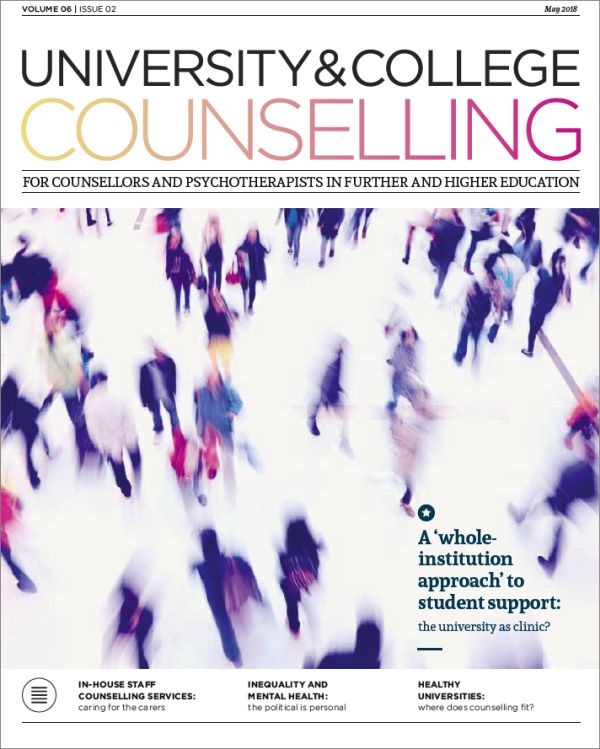In this issue
Features
The Stepchange Framework and putting mental wealth first (free article)
Professor Steve West, Vice-Chancellor at the University of the West of England, outlines the new Universities UK Framework, focusing on student wellbeing, and describes how it is being implemented at UWE Bristol
It takes a whole university to create health and wellbeing
argue Sharon Doherty, Mark Dooris and Maxine Holt
In praise of in-house counselling
Bridget Hazell, Yvonne McPartland and Eamonn O’Mahony believe that staff also need to be supported on our campuses
Inequality and wellbeing in higher education: a call for action
Laura Anne Winter, Kasia Maciagowska, Doireann Mangan and Nicky Toor explore instances of societal pressures which directly impinge on individuals’ mental health
Caring for and caring about students: the university as clinic?
How can we cope with the avalanche of students seeking support, and declaring disabilities? Yolanda Martinez gives a personal perspective from the vantage point of her role as welfare officer at the University of Birmingham
Regulars
Profile
Trevor Butlin
Divisional news
Notes from FE
Mary Jones
Notes from the chair
Géraldine Dufour
Notes from HUCS
Alan Percy

A pdf of this issue is available in the University and College Counselling archive
From the editor
When I was a university undergraduate, there was no such thing as a university counselling service. I don’t remember discussion of mental health or wellbeing; if there were concerns about someone, they’d usually be sent to see their GP. Chaplains, moral tutors, perhaps a campus nurse – that was about the extent of ‘wellbeing’ support available.
Forty years later how the landscape has changed. Counsellors, wellbeing advisors, disability workers, vulnerable students’ officers, support groups, reasonable adjustment officers, chaplains, welfare tutors… the list goes on. University life now seems to be perceived as stressful – potentially traumatic – for students, who must be supported at every step. Yet even the myriad of staff already employed to support student mental health seems inadequate…
The recently launched ‘whole institution approach’ to student mental health urges university leaders to prioritise student wellbeing so that it permeates every aspect of an institution’s life. On the Universities UK (UUK) website, we read: ‘A population approach to student mental health asks universities to reconfigure themselves as health-promoting and supportive environments.’ This seems a fundamental shift in how universities and colleges are asked to perceive themselves, and in how they promote themselves to students and parents. Didn’t universities used to be, primarily, places of learning, designed to stretch, test and provoke students along their path of personal development? How does this purpose sit beside a growing role as care-taker/protector?
In this issue, contributors unpack the notion of a ‘whole-institution approach’ to mental health. Steve West chairs the UUK working party, which has devised the newly published framework aimed at university senior management. Sharon Doherty, Mark Dooris and Maxine Holt describe the Healthy University project, arguing that counselling services have a vital part to play in cross-institution working. Laura Winter and colleagues contend that it is insufficient simply to look at the institution, or even local support services, when considering best practice but that we must consider wider social and economic trends as they impinge upon individual experiences of further and higher education. And Bridget Hazell, Yvonne McPartland and Eamonn O’Mahony widen the scope of ‘whole institution’ to include staff. Our institutions have many staff who struggle to cope with the pressures and demands of work. How can we expect staff to support students if they, in turn, are not being supported? And Yolanda Martinez gives a personal account of her role as Welfare Tutor, coping with an apparently unstoppable surge in requests for ‘reasonable adjustments’ from students who – in my day – would have been told to see their doctor.
The days of being sent automatically to the GP for a chat, whatever the problem, are over. Now, we work in environments where protecting an institution’s reputation, and being seen to be proactive in protecting vulnerable students, is held to be vitally important in the marketing of our institutions. Whatever we make of a ‘whole-institution approach’ – growing paternalism, or compassionate common sense – we can, perhaps, celebrate the fact that students are more likely to find support on our campuses, and ensure that we take the opportunities to work with colleagues to broaden awareness of the wider forces behind much of the inequality and unhappiness in our institutions.
David Mair
david.mair@bacp.co.uk
